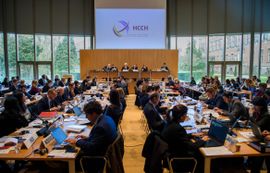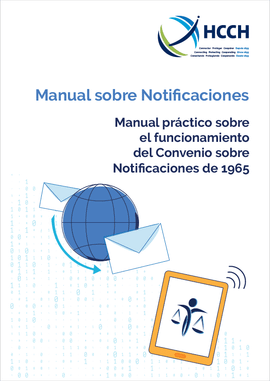Les 7 et 8 février 2023, le Bureau Permanent de la HCCH a le plaisir de co-organiser la Conférence régionale, intitulée « La HCCH et la portée de ses travaux pour l'Afrique australe », conjointement avec la Finlande et l'Afrique du Sud, à laquelle participeront la Namibie et la Tanzanie, ainsi que d'autres États de la Communauté de développement de l'Afrique australe (SADC), et dont l'Université de Pretoria (Afrique du Sud) sera l'hôte.
La Conférence régionale a été débuté aujourd'hui par un discours inaugural prononcé au nom de l'Université de Pretoria par le Professeur Dire Tladi, professeur de droit international. La première session de la Conférence a été ouverte par une présentation du Dr Christophe Bernasconi, Secrétaire général de la HCCH, sur le thème « La HCCH : avantages liés au statut de Membre et Conventions clés », suivie d'un débat sur l'importance de la coopération internationale multilatérale. La discussion, modérée par le Dr Bernasconi, a vu la participation de S.E. M. Ronald Lamola, Ministre de la Justice et des Services correctionnels d'Afrique du Sud, de M. Antti Leinonen, directeur général du ministère de la Justice de Finlande, de S.E. M. Veiccoh K Nghiwete, Haut-Commissaire de l'ambassade de Namibie en Afrique du Sud, et de M. Lennon Limbo, Chef des services juridiques du ministère de la Justice de Namibie. Les intervenants ont partagé leurs points de vue sur l'état actuel de la coopération multilatérale dans la région et ont évoqué, dans ce contexte, les expériences et les points de vue de leurs États respectifs sur les avantages, les défis et les perspectives d'avenir d'un engagement accru de l'Afrique australe auprès de la HCCH, y compris en tant que Membre, et vis-à-vis des Conventions et Instruments de la HCCH.
Au terme des discussions, le Ministre d'Afrique du Sud et les représentants de l’Afrique du Sud, de la Finlande et de la Namibie ont adopté une déclaration commune encourageant tous les États, en particulier ceux d'Afrique australe, à intégrer la HCCH en tant que Membres et à envisager de devenir Parties aux Conventions et Instruments de la HCCH. Ils se sont également engagés, entre autres, à promouvoir la visibilité de la HCCH et à explorer les possibilités de renforcer la coopération. Le Gouvernement de la Tanzanie a exprimé son intention de signer la déclaration commune dans un avenir proche.
Tout au long de la Conférence régionale, les participants auront l'occasion d'assister à des sessions thématiques portant sur les Conventions et Instruments clés de la HCCH, en présence d'experts de toute la région de l'Afrique australe.
ABOUT HCCH
The HCCH (Hague Conference on Private International Law – Conférence de La Haye de droit international privé) is the sole intergovernmental organisation dedicated to the progressive unification of private international law.
In today’s world, individuals and businesses are constantly engaged in cross-border interactions, with work, commerce, study, shopping, travel, relationships and more increasingly taking place across multiple countries. These activities require a high degree of legal certainty and predictability to thrive. However, when taking place across borders the differences between countries’ legal systems often leave gaps in the legal framework, resulting in uncertainty as to which authority has jurisdiction, which law is applicable, how decisions are recognised and enforced and what cooperation mechanisms are available to overcome challenges of cross-border judicial or administrative procedures.
The HCCH’s mission is to resolve these questions by providing internationally agreed solutions, developed through the negotiation, adoption, and operation of international treaties, the HCCH Conventions, to which States may become Contracting Parties, and soft law instruments, which may guide States in developing their own legislative solutions. These Conventions and instruments provide clarity and direction in cross-border relations across three main areas:
- International family and child protection law;
- Transnational litigation and legal cooperation;
- International commercial and financial law.
The ultimate goal of the organisation is to work for a world in which, despite the differences between legal systems, persons – individuals as well as companies – can enjoy a high degree of legal security.
Members and Connected Parties
The HCCH is composed of 90 Members – 89 States and the European Union - representing all regions of the globe. In addition, an increasing number of non-Members have either signed or become Contracting Parties to HCCH Conventions. As a result, the work of the Conference encompasses over 150 countries around the world.
HCCH Members designate “National Organs” to guide, monitor, and promote the work of the Organisation, and Contracting Parties to HCCH Conventions contribute through their Central or Competent Authorities, designated under specific HCCH Conventions.
Learn more about the HCCH Members and the Conventions to which they are party as well as the non-Member Contracting Parties (Other Connected Parties).
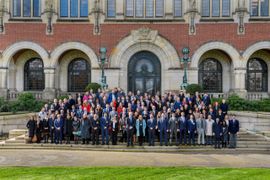
HCCH Conventions and instruments
The normative work of the HCCH consists in the negotiation and conclusion of Conventions and other legal instruments that respond to global needs.
Since its inception, over 40 Conventions and instruments have been adopted under the auspices of the HCCH. Of these, the following are widely regarded as the HCCH’s core Conventions and instruments, prioritised based on their recent adoption, popularity, or practical relevance:
- 1961 Apostille Convention
- 1961 Form of Wills Convention
- 1965 Service Convention
- 1970 Evidence Convention
- 1970 Divorce Convention
- 1980 Access to Justice Convention
- 1980 Child Abduction Convention
- 1985 Trusts Convention
- 1993 Adoption Convention
- 1996 Child Protection Convention
- 2000 Protection of Adults Convention
- 2005 Choice of Court Convention
- 2006 Securities Convention
- 2007 Child Support Convention & 2007 Maintenance Obligations Protocol
- 2015 Principles on Choice of Law in International Commercial Contracts
- 2019 Judgments Convention
Learn more about the HCCH Conventions and instruments.
Post-Convention Activities
The HCCH conducts extensive non-normative work to ensure the effective implementation and practical operation of its Conventions and instruments. To this end, the Permanent Bureau engages in various post-Convention activities:
- Publication of explanatory reports, guides to good practice and other materials, available here;
- Maintenance of online databases and platforms (INCADAT, iSupport, e-APP);
- Provision of trainings and technical assistance;
- Organisation and participation in international conferences and seminars.
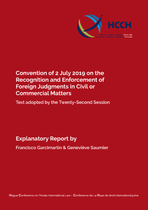
History
The origins of the HCCH date back to 1893, when delegates from 13 States convened in The Hague, at the initiative of Tobias Asser, to resolve issues relating to civil procedure and jurisdiction. This was the first “Hague Conference” on private international law, now known as the First Session of the Hague Conference. This session saw the development of the first “Hague Convention”, the Convention on Civil Procedure, which was formally adopted shortly after, in 1894, and signed on 14 November 1896.
In subsequent years, the Hague Conference met several times to negotiate international treaties on a broad range of private international law matters, until, at its Seventh Session in 1951, participating States adopted a Statute which, upon its entry into force in 1955, would establish the HCCH as a permanent intergovernmental organisation.
Since then, the HCCH has held regular plenary sessions, with substantial preparatory work and meetings in between, resulting in the adoption and implementation of over 40 Conventions and instruments.
Learn more about the HCCH’s history.
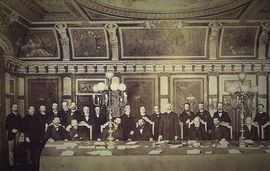
Meetings
A respected forum for effective multilateralism, the HCCH brings nations together to cooperate, through a series of regular meetings, in the joint development of mutually beneficial legal frameworks.
Plenary Sessions (or Diplomatic Sessions) are held to negotiate and adopt Conventions and to decide upon future work.
Special Commissions, composed by governmental experts, meet in between Plenary Sessions to prepare draft Conventions to be considered for adoption, as well as to review the practical operation of existing Conventions and recommend improvements in their implementation.
Experts’ Groups are exploratory bodies tasked with conducting research on specific new areas of work, while Working Groups are bodies established to develop concrete solutions in relation to existing or potential future Conventions, such as draft provisions, principles or guides.
Together, the meetings of the Plenary Sessions, Special Commissions, Experts’ Groups, and Working Groups drive forward the work of the HCCH
Consult the list of upcoming meetings, or read the HCCH’s Rules of Procedure to learn more.
Governance and Structure
The HCCH is governed and funded by its Members, which exercise their authority through its two governing bodies.
- The Council on General Affairs and Policy, which meets annually to review progress and set the work programme of the Organisation.
- The Council of Diplomatic Representatives, the Organisation’s primary financial and budgetary authority, which meets annually to approve the HCCH’s budget and apportion expenses among Members
The Permanent Bureau is the organisation’s multinational secretariat. It is responsible for the organisation of Plenary Sessions and other meetings, the conduct of preparatory research, and for supporting the proper operation of the HCCH Conventions, among other tasks. Its headquarters are located in The Hague (Netherlands), with a Regional Office for Latin America and the Caribbean in Buenos Aires (Argentina) and a Regional Office for Asia and the Pacific in Hong Kong (China).
Read the Statute of the HCCH to learn more about its governance and structure.
